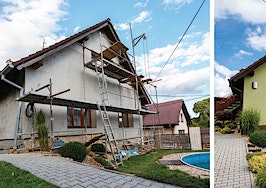- Market volatility tied to macroeconomic events in places such as China and Greece and abysmal fixed-income returns have lured 14 million U.S. investors to single-family rental (SFR) portfolios as a private wealth management (PWM) alternative.
- Research indicates gross rental yields generally ranged from 9 percent to 12 percent and the firm estimates unlevered cash returns in the 5 percent to 7 percent range.
- Large investors aren’t the only players however -- more than 5 percent of the Forbes 400 have built their wealth through real estate and the rental market is roughly 95 percent dominated by the small investor.
Getting nausea from the market volatility roller coaster?
Market volatility tied to macroeconomic events in places such as China and Greece and abysmal fixed-income returns have lured 14 million U.S. Investors, according to data from RentRange commissioned by B2R Finance, to single-family rental (SFR) portfolios as a private wealth management (PWM) alternative.
This migration is fueled in part by the fact that demand for rentals has surged and grown from 40.7 million in 2010 to a projected 47.9 million in 2020 and 53.7 million in 2030.
This shift should come as no surprise as returns on rental investments can be quite attractive. Research from Keefe, Bruyette & Woods titled, “Securitization of Single-Family Rentals,” indicates gross rental yields generally ranged from 9 percent to 12 percent and the firm estimates unlevered cash returns in the 5 percent to 7 percent range.
Levered internal rates of return could exceed 15 percent depending on price appreciation and leverage.
This combination of demand and returns has attracted large institutions, with firms putting roughly $25 billion into the single-family rental market in the form of 150,000 properties.
Large investors aren’t the only players however — more than 5 percent of the Forbes 400 have built their wealth through real estate and the rental market is roughly 95 percent dominated by the small investor.

Elena Elisseeva / Shutterstock.com
Unlike stocks and bonds, real estate is a tangible asset
Want to see where your money is? Just drive down the block. There’s also a double bottom line return: the rental property investor generates a fiscal return and also benefits from the overwhelmingly positive feeling that investing in neighborhoods and providing high-quality housing brings.
Compared to other investments that might offer little transparency or control, rental properties can put you in the driver’s seat.
[Tweet “Compared to other investments, rental properties can put you in the driver’s seat.”]
Like any investment, real estate carries risk, but it can offer a host of economic benefits including tax advantages, asset appreciation and perhaps most important, the opportunity to leverage debt through a hard asset to create income.
Low mortgage rates and increased available funding enable individual investors to enter the market or grow their portfolios with modest initial investment or equity from an existing property.
New fintech entrants to the traditionally archaic mortgage lending industry have leveraged technology to add a turn-key element, which makes identifying and investing in a rental property fast, easy and possible from nearly anywhere.
As Americans strive for financial freedom and more than 1 in 4 (27 percent) report real estate as the best investment; it’s an asset class that cannot be overlooked. That’s why SFR is becoming the new PWM.
Jason Hogg is CEO of B2R Finance. Follow the company on Twitter @B2RFinance.




